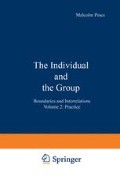Abstract
In Jung and Ricklin’s association experiment the subject is asked to react immediately to a certain stimulus word by stating the first word that comes into his mind. In a limited field experiment carried out within a small circle of psychotherapists I used two stimulus words, namely ‘Zen’ and ‘Gestalt’.
Access this chapter
Tax calculation will be finalised at checkout
Purchases are for personal use only
Preview
Unable to display preview. Download preview PDF.
References
Farson A., The Technology of Humanism (J. Humanistic Psychol., 18, 2, 1978)
Kapleau, Ph., The Wheel of Death (London: G. Allen & Unwin Ltd., 1972)
Kennett, J., Selling Water by the River (New York: Vintage Books, 1972)
Koffka, K., Principles of Gestalt Psychology (London: Routledge & Kegan Paul, 1955)
Köhler, W., Gestalt Psychologie (Utrecht: Erven J. Bijleveld 1951)
Price, A.F. & Wong Mou-lam, The Diamond Sutra (trans.) (Berkeley: Shambala Public., 1973)
Ram Dass, Grist for the Mill (Santa Cruz: Unity Press, 1976)
Sasaki, R., The Recorded Sayings of Ch’an Master Lin-chi Hui-chao of Chen Prefecture (Kyoto: Institute for Zen Studies, 1975)
Sekida, K., Zen Training, Methods and Philosophy (New York/Tokyo:. J. Weatherhill, 1975)
Susuki, S., Zen Mind, Beginners Mind (New York/Tokyo: J. Weather-hill, 1975)
Tophoff, M., Isolement en Versmelting: Polariteiten van Inter-actie (Maandbl. Geestel. Volksgez., 5, 1976)
Author information
Authors and Affiliations
Editor information
Editors and Affiliations
Additional information
This article is dedicated to Omori Soghen Roshi, Abbot of Seitaiji, knowing that he will have a good laugh about it.
Rights and permissions
Copyright information
© 1982 Plenum Press, New York
About this chapter
Cite this chapter
Tophoff, M. (1982). An Empty Mirror: The Problem of Interpersonal Boundaries. In: Pines, M., Rafaelsen, L. (eds) The Individual and the Group. Springer, Boston, MA. https://doi.org/10.1007/978-1-4684-8154-9_44
Download citation
DOI: https://doi.org/10.1007/978-1-4684-8154-9_44
Publisher Name: Springer, Boston, MA
Print ISBN: 978-1-4684-8156-3
Online ISBN: 978-1-4684-8154-9
eBook Packages: Springer Book Archive

